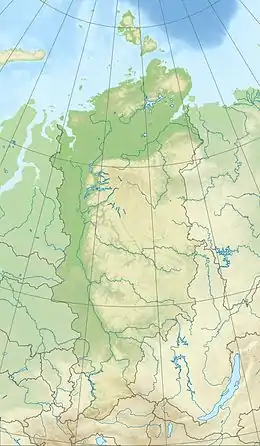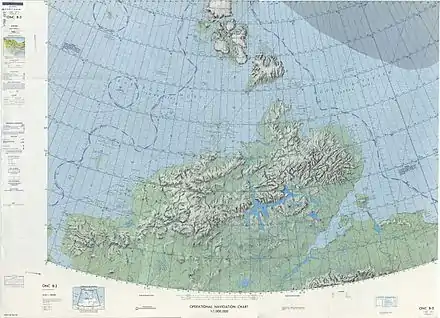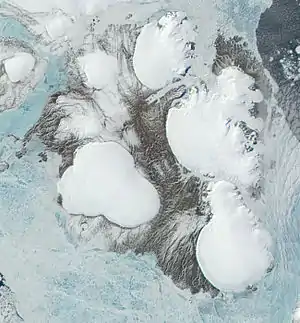Cape October
Cape October (Russian: Мыс Октябрьский; Mys Oktyabr’skiy)[1] is a headland in Severnaya Zemlya, Russia.
| Cape October | |
|---|---|
| Мыс Октябрьский | |
 Location of Cape October in Krasnoyarsk Krai | |
| Location | October Revolution Island, Severnaya Zemlya, |
| Coordinates | 80°6′N 95°0′E |
| Offshore water bodies | Red Army Strait |
| Area | Russian Far North |
History
This cape was named during the 1930–1932 expedition to the archipelago led by Georgy Ushakov and Nikolay Urvantsev after the month of the 1917 Russian Revolution.[2]
Thelodonti fossils from the Upper Silurian have been found in the area of the headland,[3] as well as extinct marine mollusks of the Hiatellidae family.[4]
Geography
Cape October is located in a low-lying unglaciated area of the northern part of October Revolution Island north of the Albanov Glacier. It faces the Red Army Strait opposite the Academy of Sciences Glacier on Komsomolets Island shore.[5] Visoky Island lies about 18 km (11 mi) east and Bolshoy Izvestnikovky Island about 13 km (8.1 mi) to the southwest of the cape, near the confluence with the Yuny Strait.[6]
 1975 map showing Severnaya Zemlya and the Taymyr Peninsula |
 Satellite image of October Revolution Island |
References
- МЫС ОКТЯБРЬСКИЙ • ДИКСОНСКИЙ РАЙОН • ТАЙМЫРСКИЙ АВТОНОМНЫЙ ОКРУГ
- Архипелаг Северная Земля — один из наиболее крупных районов оледенения на территории России
- Karatajūtē-Talimaa, Valentina; Märss, Tiiu (2002). "Upper Silurian thelodonts from Severnaya Zemlya Archipelago (Russia)". Geodiversitas. 24 (2): 405–443. INIST:13724455.
- ЗНАЧЕНИЕ МОЛЛЮСКОВ РОДА CYRTODARIA ДЛЯ СТРАТИГРАФИИ КАЙНОЗОЙСКИХ ОТЛОЖЕНИЙ АРКТИКИ
- GoogleEarth
- "Mys Oktyabr'skiy". Mapcarta. Retrieved 28 December 2016.
External links
- Russian scientists have found a sharp decrease in the concentration of ozone over the Cape October Research Base (in Russian)
- Thélodontes du Silurien supérieur de l’Archipel de Severnaya Zemlya (Russie)
- МОРСКИЕ МОЛЛЮСКИ АТЛАНТИЧЕСКОГО ПРОИСХОЖДЕНИЯ ИЗ ОТЛОЖЕНИЙ ПЛИОЦЕНА – ЭОПЛЕЙСТОЦЕНА ЗАПАДА РОССИЙСКОЙ АРКТИКИ И ИХ БИОСТРАТИГРАФИЧЕСКОЕ ЗНАЧЕНИЕ - Моллюски рода Isocrassina